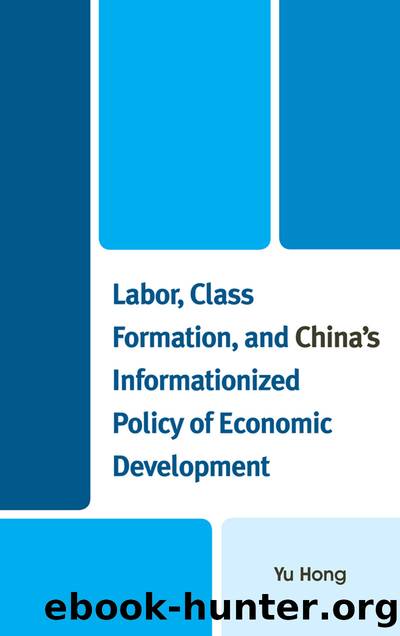Labor, Class Formation, and China's Informationized Policy of Economic Development by Hong Yu;

Author:Hong, Yu; [Hong, Yu]
Language: eng
Format: epub
ISBN: 678208
Publisher: Lexington Books/Fortress Academic
CARROT-AND-STICK: MANAGERIAL DEVICES AND LABOR DISCIPLINE
The modes of labor control in the ICT sector are perceived as paradigmatic because electronics manufacturing was one of the few sectors to undergo a systematic production globalization in the 1960s and, then, it pioneered the development of communication and production technologies to facilitate more complex cross-border production networks in the 1990s.80 However, as Mohseni pointed out, rather than break away from âtraditionalâ industries, the electronics and computer industry has perpetuated the capitalist imperative of ruthlessly saving labor costs through labor control techniques. In the mass production stage of creating high-tech products, the labor process continues to be labor intensive, highly exploitative, and strictly following Taylorist and Fordist principles; even corporate global expansion to peripheral parts of the capitalist world is largely motivated by the drive of saving on labor costs.81 Through globalization of production, transnational corporations get closer to new markets, but it does not reduce, in the eyes of foreign investors, the attraction of âdiligent and qualified Chinese workers as the most important factor.â82
Besides the drive of transnational capital, the state also plays a central role in constructing Chinaâs labor relations. In particular, the state has acquiesced to the expansion of capitalist relations spearheaded by foreign-invested firms in the electronics and computer industry. Ever since the beginning of Chinaâs economic reform, the state has given foreign-invested firms considerable autonomy in the management of labor forces. In the late 1970s, for example, foreign firms were granted by the 1979 Joint Venture Law with the power to âhire and fireâ and to âdetermine wages and bonuses as the market dictate.â83 The decentralization of the foreign investment approval process and the opening up of more sectors and regions to foreign capital further incited unchecked competitions among local governments for foreign capital; local governments tended to undertake âmore accommodating and less restrictive posturesâ toward foreign investors in the field of labor relations.84 At the outset, the state endorsed capitalist relations not so much to contain costs as to attract foreign investment. This was particularly true in the ICT sector because, as we saw in chapter 2, the state authorized foreign direct investments to jumpstart Chinaâs ICT production and exports.
Indeed, labor relations in the ICT sector have been shaped concertedly by neoliberal globalization and by the state-initiated transition to the market economy. As China-based ICT firms are mostly engaged in ânondifferentiable production activities,â85 the working conditions, âfrom working with high-powered microscopes for assembling components, to using hazardous chemicals for washing the wafers, to working in ââ¬Ëclean roomsâ where the most sensitive computer components are fashioned, are dangerous and unbearable.â86 Although the overcrowded, government-engineered labor market has compelled workers to accept jobs in this industry, other managerial techniques are still needed to maintain workplace discipline and compliance. Control devices in the workplace, including technical architecture, depersonalized management, divisive reward systems, and hierarchical job structures, help strengthen the capitalist power relations and subsume workforces under the organizational control of capital. Recognizing the orchestrated nature of constructing the capitalist labor relationship,
Download
This site does not store any files on its server. We only index and link to content provided by other sites. Please contact the content providers to delete copyright contents if any and email us, we'll remove relevant links or contents immediately.
International Integration of the Brazilian Economy by Elias C. Grivoyannis(74796)
The Radium Girls by Kate Moore(11621)
Turbulence by E. J. Noyes(7700)
Nudge - Improving Decisions about Health, Wealth, and Happiness by Thaler Sunstein(7242)
The Black Swan by Nassim Nicholas Taleb(6764)
Rich Dad Poor Dad by Robert T. Kiyosaki(6175)
Pioneering Portfolio Management by David F. Swensen(6079)
Man-made Catastrophes and Risk Information Concealment by Dmitry Chernov & Didier Sornette(5647)
Zero to One by Peter Thiel(5488)
Secrecy World by Jake Bernstein(4388)
Millionaire: The Philanderer, Gambler, and Duelist Who Invented Modern Finance by Janet Gleeson(4094)
The Age of Surveillance Capitalism by Shoshana Zuboff(3985)
Skin in the Game by Nassim Nicholas Taleb(3965)
The Money Culture by Michael Lewis(3846)
Bullshit Jobs by David Graeber(3830)
Skin in the Game: Hidden Asymmetries in Daily Life by Nassim Nicholas Taleb(3723)
The Dhandho Investor by Mohnish Pabrai(3560)
The Wisdom of Finance by Mihir Desai(3523)
Blockchain Basics by Daniel Drescher(3329)
